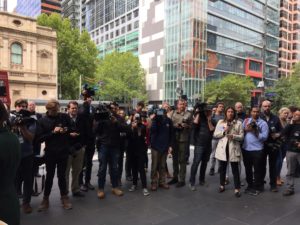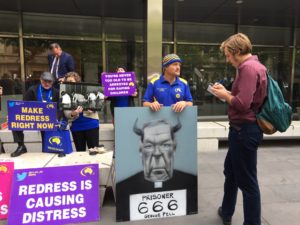Frank Golding, 13 March, 2019 at the Melbourne County Court
Flanked by five hefty policemen, the Cardinal sits impassively at the rear of County Court Room 3.3, while from the front, Chief Judge Kidd reads his sentencing report, without relent. Not accustomed to listening to others for such a stretch, Pell will have to wait more than an hour before he learns the length of his punishment. Kidd makes a few things clear—scrupulously, meticulously. The criminal is being punished as George Pell, citizen, for the particular crimes he has been convicted of—sexually abusing two boys in the 1990s—“and only of that wrongdoing”.
As I directed the jury who convicted you in this trial, you are not to be made a scapegoat for any failings or perceived failings of the Catholic Church. Nor are you being sentenced for any failure to prevent or report child sexual abuse by other clergy within the Catholic Church. You have not been charged with or convicted of any such conduct or failings.[1]
The Judge turns to the impact of the crimes. The first episode in the priests’ sacristy, he says, was “a brazen and forcible sexual attack upon the two victims”. It had a “nasty element to it”. Heads turn in the audience to the back of the courtroom to catch a response. Pell appears not the least bit daunted. Heads turn again when the Chief Judge reads:
In my opinion, all of the offending – across both episodes – is made significantly more serious because of the surrounding or contextual circumstances, namely, the breach of trust and abuse of power. This elevates the gravity of each of the offences. In my view, your conduct was permeated by staggering arrogance.
Surely, the Cardinal’s body or facial expression will respond to that denunciation. Some defiance? Some show of disdain? Do I detect some frailty? Mortification perhaps, even, humiliation? None of that. George Pell has eye contact only for the man in charge of proceedings, Chief Judge Kidd.
Not even when mitigating factors are mentioned: “You are clearly an intelligent and hardworking man”; “your otherwise blameless life”; and taking into account that “you have been publicly pilloried, both in the media, and through the publication of a particular book…punishment that you have received over and above the punishment which I will impose upon you today...” The Judge does not mention Pell’s cheer squad: media commentators who use their power to malign the jury and contest the evidence and character of witness J—without benefit of seeing his evidence or the rigorous, expert cross-examination that accompanied it.
After an hour and seven minutes, the Judge directs, “Cardinal Pell, will you please stand.”Heads turn again. The sentences are pronounced for each of the five charges, in turn. There are soft gasps: 2 years and 6 months imprisonment; 4 years imprisonment; 2 years and 6 months imprisonment; 15 months imprisonment; 18 months imprisonment. I try to calculate, but Judge Kidd is too quick. “This means that I sentence you to a total effective sentence of 6 years’ imprisonment…I set a non-parole period of 3 years and 8 months.” Less the 14 days he has already served.
A woman to my left weeps quietly.
There is one final act. A ritual humiliation for such cases. The Judge tells Pell he must sign the document that will place him on the Sex Offenders Register—for life. Heads turn again to watch. A court attendant and Pell’s solicitor—both young women—walk slowly to the back of the room. I hear Pell utter a few faint words. He wants to be sure where he is to sign.
“Cardinal Pell can be taken away, please”. The directive startles. Thousands of criminals before him have heard similar final words—though perhaps not so politely framed. It is only when George Pell shuffles towards the back door of the Court that I notice he is not wearing his white clerical dog collar. He is grey, and seems smaller than when he came in.
I’m told that, once out of the building, he is handcuffed before being placed in the white unmarked van that is to take him to prison where he will serve the next three years and eight months—or more.
Only the early birds—perhaps 150—have found a seat in the courtroom. They hear the Judge’s sentencing at the same time as George Pell. Outside, others are watching and listening on their smart phones. A barrage of media clamour for more interviews, colour and movement.
They have already filmed the posters held by a regiment of members of Care Leavers Australasia Network(CLAN),a support group for adults whosuffered abuse and neglect in foster care and orphanages. I talk to Mwho grew up with me in the Ballarat Orphanage—not a Catholic institution.
“Thank God he got a sentence; but it should have been at least ten years.” She speaks in solidarity with victims at that orphanage—an example must be made to encourage more prosecutions. Others, equally jubilant, care less about the length of the sentence. “Even one year would have been enough,” says D. “He’s now a convicted paedophile. There is justice after all.”
A woman clutching rosary beads accuses the protesters of being evil, “spawns of the devil”. The sign that Robbie holds is a disgrace, she shouts. Cool heads soon prevail.
I go home with a jumble of thoughts—a double whiskey jumble. I read the commentators: “In the squalor of this moment there is little to celebrate.” (David Marr [2]). “If we still believe in some concept of inherent human dignity, it’s precisely at moments like this that it matters”(Waleed Ali [3]). I cannot forget the Chief Judge’s words to Pell:
You maintain your innocence in relation to this offending, which is your right, but as a consequence there is no evidence of your remorse or contrition for me to act upon to reduce your sentence.
I get an email from a friend asking if I feel sorry for George Pell. I reply, “Not yet.”
For the moment, I give the last word to witness J—the survivor whose evidence to the judge and jury was instrumental in the verdict of guilty. Outside the County Court, his solicitor Dr Vivian Waller reads his statement to the clamour of media:
It is hard for me to allow myself to feel the gravity of this moment. The moment when the sentence is handed down, the moment when justice is done. I appreciate that the court has acknowledged what was inflicted upon me as a child. However, there is no rest for me.
I gave evidence for several days. I was cross-examined by Pell’s defence counsel. A jury has unanimously accepted the truth of my evidence. Pell chose not to give evidence. The jury did not hear from him. He did not allow himself to be cross-examined….
I am waiting for the outcome of the appeal like everyone else.
Footnotes
[1] All quotations from Chief Judge Kidd are from DPP v Pell (Sentence) [2019] VCC 260, 13 March 2019.
[2] David Marr, ‘Pell’s jailing defies the might of Rome but his fall is too appalling for celebration,’ The Guardian, 13 March 2019.
[3]Waleed Ali, ‘This is why we don’t leave justice in the hands of victims,’ The Age 14 March 2019.



Essential reading.